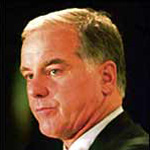By John Briggs
Published October 11th 2005 in Burlington Free Press
The exact procedures for instant runoff voting go to the Burlington City
Council tonight with a hurry-up request from the Charter Change
Committee that they be approved on the spot.
Jo LaMarche, assistant city clerk and the director of elections and
records, told the council in a note attached to the proposed rules that
the committee wants instant action "in order that we may proceed in
educating voters in the city which will include a mock election in the
month of November."
City voters in March approved the instant runoff system for mayoral
elections. It would require that the winning candidate ultimately win 50
percent of the vote, plus one. Under the system used in the past, a
candidate could win with as little as 40 percent of the vote.
The new system allows voters to rank the candidates in order of
preference. If no candidate wins a majority in the first round, the
candidate with the smallest number of votes is eliminated. Then, the
second choice of those who voted for that person are added to the votes
of the remaining candidates. The process continues until one candidate
wins a majority.
.
--
Rob Richie
Executive Director
F a i r V o t e
The Center for Voting and Democracy
6930 Carroll Avenue, Suite 610
Takoma Park, MD 20912
www.fairvote.org
[email protected]
(301) 270-4616
Eliminate the 'wasted vote' syndrome by ranking candidates (1, 2, 3) and requiring a majority of votes to win. Consolidate local runoff elections into one money-saving vote.
To subscribe or unsubscribe, send a small note to [email protected]
For more information: www.fairvote.org, www.midwestdemocracy.org, www.instantrunoff.com
MAKE YOUR VOTE COUNT!
(Take five minutes every day for some IRV activism -- we'll only get better elections with your persistent, patient work. Word-of-mouth is your most powerful political weapon: use it!)
 On March 16th, Former Vermont Governor and Democratic National Committee Chair Howard Dean continued his support for instant runoff voting on Vermont Radio's Mark Johnson Show. Commenting on Burlington's recent IRV election, Dean said "I think the best and most democratic way to use to elect people in multiparty elections is instant runoff voting." Dean also supported the system when it was first used in Burlington in 2006.
On March 16th, Former Vermont Governor and Democratic National Committee Chair Howard Dean continued his support for instant runoff voting on Vermont Radio's Mark Johnson Show. Commenting on Burlington's recent IRV election, Dean said "I think the best and most democratic way to use to elect people in multiparty elections is instant runoff voting." Dean also supported the system when it was first used in Burlington in 2006. Citizens of Burlington, Vermont went to the polls on Tuesday, March 3rd to vote for the second time in an election using instant runoff voting. At 8:25 PM, the city declared that incumbent Mayor Bob Kiss had won reelection in the third and final round of counting, narrowly edging out challenger Kurt Wright, 51.5% to 48.5%. The race was unique in that it had four candidates that had a legitimate shot at winning: Progressive Kiss, Republican Wright, Democrat Andy Montroll, and independent Dan Smith. In most other American cities, there would be fear of "spoiler" candidates, but IRV allowed all four candidates to run without having to worry about being labeled "spoilers."
Citizens of Burlington, Vermont went to the polls on Tuesday, March 3rd to vote for the second time in an election using instant runoff voting. At 8:25 PM, the city declared that incumbent Mayor Bob Kiss had won reelection in the third and final round of counting, narrowly edging out challenger Kurt Wright, 51.5% to 48.5%. The race was unique in that it had four candidates that had a legitimate shot at winning: Progressive Kiss, Republican Wright, Democrat Andy Montroll, and independent Dan Smith. In most other American cities, there would be fear of "spoiler" candidates, but IRV allowed all four candidates to run without having to worry about being labeled "spoilers." On April 4, Vermont governor Jim Douglas chose to veto legislation to re-establish majority elections for Congress in his state through instant runoff voting. Vermont would have been the first state to enact IRV for Congress; legislative leaders affirmed their commitment to the bill, and it is sure to move in the state again. FairVote has worked hard to support this legislation, which likely generated more than 600 phone calls to the governor from Vermonters.
On April 4, Vermont governor Jim Douglas chose to veto legislation to re-establish majority elections for Congress in his state through instant runoff voting. Vermont would have been the first state to enact IRV for Congress; legislative leaders affirmed their commitment to the bill, and it is sure to move in the state again. FairVote has worked hard to support this legislation, which likely generated more than 600 phone calls to the governor from Vermonters.